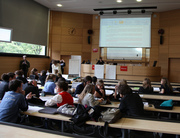> Make notes on the following:
- Words and expressions, even if you are unsure about how to write them (you can always check the spelling after the lesson). Copy everything that is on the board!
- When you have had to say something and the teacher has given you new words, write them down as soon as you have finished speaking, otherwise you’ll forget! Ask for the spelling if needed.
- Note down ideas on the topic under discussion (this will be useful for the orals and for any written task).
- Any idea for further research that you may wish to undertake in your private study (for example, you may want to find out a bit more about that singer whose biography we read, or may wish to listen to one of their songs on line ; or find out about a town, a museum, etc)
- Grammar notes (explanation in your own words, or reminders to check some things you may be unsure about, etc).
> Ask any questions in French (can you have another sheet, can your work be checked, etc), give any explanation in French. For example, why you are late, why you are tired, what you found difficult in the prep, the fact that you need to go to an appointment - ALL in French!
> Ask questions about the language (if a new word comes up, what would be a good synonym, has it got any idiomatic usage, etc?)
> Contribute your own views on the topics discussed. Lessons are the only opportunity in the term time for you to develop your oral fluency and your accent.
> Go over assessed work and make sure you understand where you lost marks and what mistakes you made. Make a list of those mistakes and use the list to proof-read your written preps.
> Speak French at every opportunity. Not just in class. Try and have lunch speaking in French with people from your class or French-speaking people from the school.
Back to Tips and tools (Techniques de travail)

